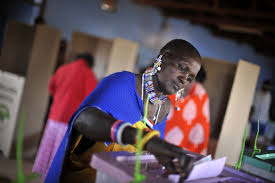Governance and the economy are as intertwined as the double helix of the human DNA.
Recently, on 4th November 2014, the USA held its mid term elections. A midterm election is a poll where the people elect their representatives in the middle of the term of the executive or of another set of members. In the case of the USA it was in the middle of President Obama’s second term, and the Republicans emerged victorious with a majority of seats. Shitemi Khamadi examines the possibility of Kenya having mid term elections:
The US Congress is now firmly in Republican’s hands following their wins in this week’s midterm polls and this has ramifications for the President as he winds up his tour of duty. The remaining two years will be crucial to both Democrats and Republicans as they angle on the 2016 elections. But President Obama needs to find ways of working with Congress to get things done and not necessarily compromise on this he holds dearly. It is an interesting balancing act which many will feel in foreign policy decisions.
That midterm poll reverberate dialogues in Kenya about having staggered elections. This would entails electing the six office holders at different times. Such a bold move will have to be through a constitutional amendment. But questions still linger whether it is something doable and realistic, beyond the cost implications.
Our politics is very pernicious. Early this month, the Orange party took political hooliganism to the next level. By ejecting, primordially the Executive Director of the party, the true character of it came out to the fore. Already, the party is yet to make public the report on what happened in the bungled party elections. That report, if made public, will certainly be doctored. It is a script and this last week incident is likely to be a script as well.
That is one side of our politics; they lack internal democracy. Outside of it, their followers only do so for myopic ethnic reasons driven by the possibilities of filling the stomach. The stomach can get full, but better vomits as you continue eating than share the pie.
This leads to the main issue of ideology. Without an ideology, the drive for people to see that certain policies will affect them in one way or the other lacks in totality. In the US for instance, foreign policy dialogues will shift towards more military boots and forceful engagement with perceived enemies and more support for allies. That is the republican approach to doing things ‘to protect America at any cost.’
It is this ideology that moves people or makes them to vote for their candidate of choice. In the US, a high voter turnout by the republicans has helped propel them to lead Congress. However the situation would be totally different in Kenya.
A good way of looking at how a staggered election would be is to dissect by-elections. One, the voter turn-out is always low. Dynamics like work negatively affect the turnout. Secondly, the interests are more about the individual and not the party and with the exception of certain strong holds of respective political parties. Even so, the individual would work out ways of getting into these parties that guarantee their triumph.
When people go to a General Election, they know they are voting for a whole bunch of people at one go and only revisit it after five years. In most cases, they vote along party lines which have ethnic followings. This sweeping of seats ensures the party controls a region or country and can decide how to manoeuvre with development.
These voters largely have allegiance to the party leader and not the other political seats. The result is that they will go to vote because the party leader will ‘deliver manna from political heaven’. The smaller seat is just a jukebox, a means to an end. It means that the omena will be haggling around the tilapia knowing that is the key to political glory and the tilapia will use the omena as foot soldiers when need arises.
In this scenario where it is the party leader who is largely the presidential candidate holds the mantle, a staggered election is a bad idea. Once the president wins office, allegiance does not follow or the other seats are not inherited in terms of weaving an election.
The result is that when such occurs, the ramifications on how the government will function totally change. It is a great idea as it really enriches organs of government like Parliament and there is a good institutional memory that is critical to Parliament’s agenda. But until Kenyans mature politically, let the birds whistle and those who change tune are stamp their feet. Those who maintain course will be political experiments of what not to. Unfortunately, the latter holds true about Kenyans in their relationship with politics and politicians.
This article first appeared on shitemi.com, you can read the full article here.
